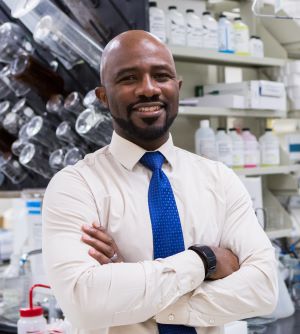
Damilola Daramola
Assistant Professor, Chemical and Biomolecular Engineering
Ohio University
Modular Resource Recovery Facilities explored via Electrochemical Nutrient Reduction from Wastewater
April 18
4:00 – 5:00 p.m.
Miller Hall, Room 301
Abstract
Inefficient conversion in animal bodies combined with excess application as crop fertilizer has ensured that macronutrients – N and P – accumulate as waste in the current linear economy of food. The impact of this food economy is further exacerbated by the significant embodied energy in the waste and the eutrophication of water systems: the Food-Energy-Water Nexus. Another example of this FEW Nexus is the increased energy consumption in municipal wastewater treatment facilities due to nutrient content in recycle streams: a consequence of solid waste management. What if we could recapture these excess nutrients using an approach that both depends on renewable energy and is scalable to the specific facility? Further, what if these recaptured nutrients could be delivered in a manner that negates eutrophication via controlled nutrient release? These ideas are the subject of this talk and will be discussed in the context of bench-scale electrochemistry, materials characterization and flowsheet modeling.
Bio
Dr. Daramola is an assistant professor in the Department of Chemical and Biomolecular Engineering and the assistant director for research in the Institute for Sustainable Energy and the Environment, both at Ohio University. Dr. Daramola’s group works in areas related to wastewater remediation, thermoset composites and polymer upcycling using a combination of techniques including electrochemistry, process simulations and materials synthesis. These projects include a recent $2.5M grant from the Advanced Manufacturing Office of the U.S. Department of Energy (2021) focused on electrochemical nutrient recovery from municipal wastewater facilities.
Dr. Daramola earned his B.S. and Ph.D. in Chemical Engineering from Ohio University, with his dissertation focused on computational surface science research relevant for water remediation technology development. Prior to returning to Ohio University, Dr. Daramola spent a brief stint in industry within Ashland Inc.’s Specialty Polymers and Adhesives group.